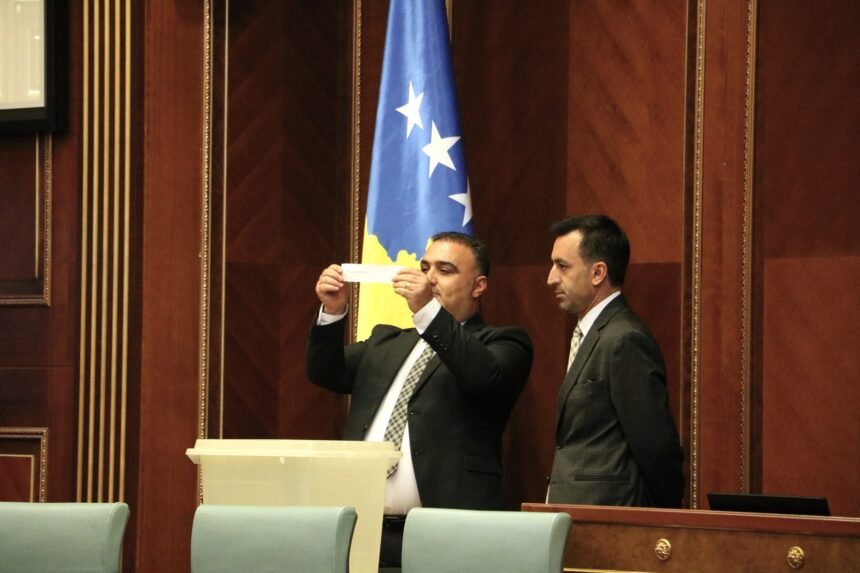For one of the drafters of the Constitution of Kosovo, Ismet Salihu, the Assembly has not yet been fully constituted, despite the Speaker claiming otherwise.
“The constitution of the Kosovo Assembly occurs only when all bodies are completed – the Speaker, Deputy Speakers, and committees. Until then, this Assembly cannot be considered constituted,” Salihu told Radio Free Europe.
Speaker Dimal Basha declared the constitutive session closed on August 30, even though the Serbian Deputy Speaker had not been elected.
Of the five Deputy Speakers required by the Constitution, four were elected – three Albanians and one representative of non-Serb minorities – while the fifth, from the Serbian community, failed to secure enough votes.
Basha stated that all possibilities for electing him had been exhausted and that the session could be considered concluded.
“For me, it makes no sense to block the Republic’s Assembly over the failure to elect one Deputy Speaker,” he reiterated on September 1.
Following this situation, Salihu suggested waiting for a decision from the Constitutional Court.
On August 30, the Serb List – the largest Serbian party in the Assembly – filed a complaint with the Constitutional Court regarding the voting procedure for the Serbian Deputy Speaker, criticizing Basha for putting minority Deputy Speakers to vote separately and using a draw for Serbian candidates.
“The Constitution is very clear: the largest parliamentary group of the Serbian community parties has the right to propose the Speaker or Deputy Speaker of the Assembly,” Salihu explained.
“Therefore, the Serbs were treated unfairly because only the Serb List had the right to propose the Deputy Speaker from the Serbian community, regardless of whether we wanted it or not,” he added.
The Serb List proposed only Sllavko Simić as Deputy Speaker, but he failed to secure the required 61 votes in any of the three voting rounds, prompting Basha to use a draw among the ten Serbian deputies – nine from the Serb List and one from the Party for Freedom, Justice, and Survival.
Naim Rashiti, Director of the Balkan Policy Group, considers that “everyone made mistakes.”
“In principle, the procedure was violated by both the Speaker of the Assembly and the Serbian representatives because they did not proceed with proposals according to the rule set by the Constitutional Court. Now… nothing can be done. We must wait for the Constitutional Court’s decision, which I believe will return the voting process for community representatives in the Assembly’s Presidency… how long this will take, I don’t know,” Rashiti told Radio Free Europe.
He assesses that these moves were in fact designed to delay the constitution of the Assembly and the start of procedures for forming a new government.
“From the beginning, the same strategy existed: delaying processes to secure a different parliamentary majority, creating circumstances that would eventually favor greater political support for a particular party, in this case – primarily – the election winner, Vetëvendosje,” Rashiti said.
Similar doubts have been expressed previously, as the ruling Vetëvendosje party of acting Prime Minister Albin Kurti did not secure enough votes in the February 9 elections to govern alone.
Rashiti says these “political maneuvers” have occurred in the past but “were more transparent.”
“I have the impression that everyone is aware the [Assembly constitution] procedure has not been closed and no one will take action for forming the government,” he said.
By law, the President of Kosovo, Vjosa Osmani, must mandate the winning party or coalition to form the government after the Assembly is constituted.
Following a September 1 meeting with Speaker Basha, her office stated that “the Presidency’s legal team is analyzing the process of constituting the Kosovo Assembly.”
Zahir Çerkini, professor of Constitutional Law at the University “Isa Boletini” in Mitrovica, also confirms that the Assembly is not fully constituted without electing all Deputy Speakers.
“Article 67 of the Constitution explicitly states that the Assembly’s Presidency consists of the Speaker and five Deputy Speakers, including one from the Serbian community and one from other non-majority communities,” Çerkini told Radio Free Europe.
“The Assembly’s Rules of Procedure confirm that the constitutive session cannot be considered concluded without this step. This is a clear constitutional provision,” he added.
Since April 15, dozens of attempts have been made to fully constitute the Assembly, all without success due to political disagreements.
The matter has also been referred to the Constitutional Court, which has issued two rulings with deadlines and guidance for the process. The first deadline was not respected, while the second expires on September 18.
On September 1, Basha convened a Presidency meeting to consult on institutional functioning, but it did not take place due to lack of quorum. Two Deputy Speakers from former opposition parties, who disagree with Basha’s decision on the constitutive session, did not attend.
“The Assembly has elected the Speaker and four Deputy Speakers. The Assembly’s Presidency has five out of its six members elected. Over 80% of the Presidency is functional, and I believe we have sufficient quorum to continue our work,” Basha insisted.







